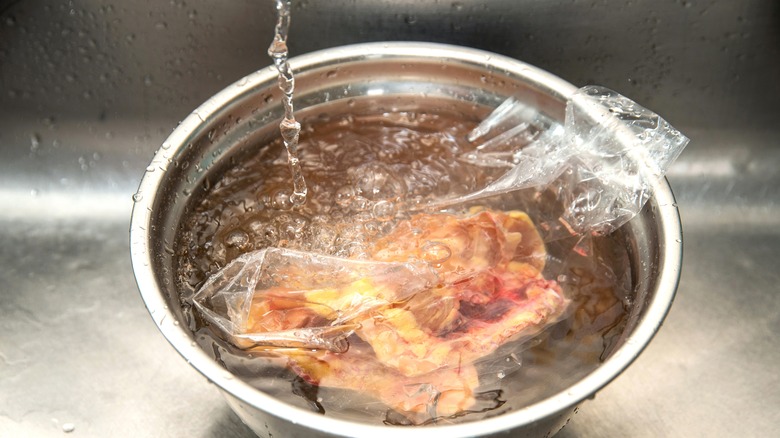Should You Defrost Chicken Thighs Before Cooking Them?
If you have chicken thighs in the freezer, you may be wondering if it's totally necessary to defrost them before cooking. To find out, we spoke to Marissa Stevens, recipe developer and founder of Pinch and Swirl. According to Stevens, you can cook your chicken from frozen (so long as the internal temperature reaches 165 degrees Fahrenheit), but you may not get the most ideal result. "Frozen thighs don't brown well, seasonings don't stick, and marinades don't soak in," she explains. Similarly, it's harder to achieve crispy skin when cooking skin-on thighs from frozen, although using an air fryer can help.
Your best bet is to defrost the thighs. Stevens recommends thawing them overnight in the fridge, preferably on a plate to catch any liquids. When doing so, it's best to plan ahead, as it's a slow thawing process that can take up to two days, depending on how large the chicken is. If you're short on time, don't panic: You can still thaw them relatively quickly.
"The method I use most is to transfer them to an airtight plastic bag and submerge [them] in cold water (sometimes I weigh them down to stay under)," Stevens says. "Change the water every 30 minutes until they're thawed." However, this method can take up to three hours or more, also depending on how large the chicken is. It may not be the best method for a big batch, as you won't be able to change the water overnight.
Mistakes to avoid when defrosting chicken
Keep in mind that there are some chicken defrosting methods that are better to avoid. For example, one common meat-thawing mistake is keeping your meat on the counter at room temperature. Similarly, defrosting it in a bowl of hot water is also a big no-no. This is because both of these methods can cause the exterior of the chicken to reach the "Danger Zone" — where bacterial growth occurs rapidly — while the inside remains frozen. This can happen when the meat is between 40 and 140 degrees Fahrenheit.
While using the microwave is technically safe for thawing, Marissa Stevens doesn't like it in practice. "It starts cooking the outside while the middle is still frozen," she explains. The microwave can also cause the chicken to suffer in other ways, like developing an off-putting odor, a strange grayish hue, and rubbery patches on the outside. If you do choose to use the microwave, make sure to cook the chicken immediately after thawing, as there will likely be warmer parts of the meat due to this method.


